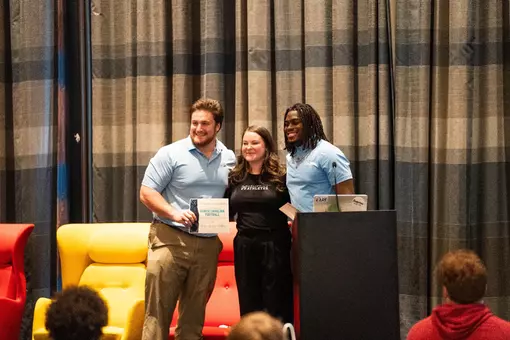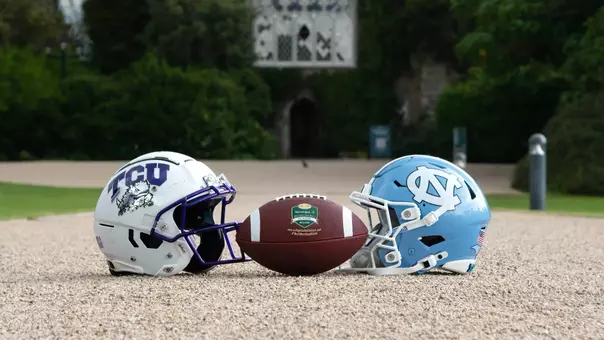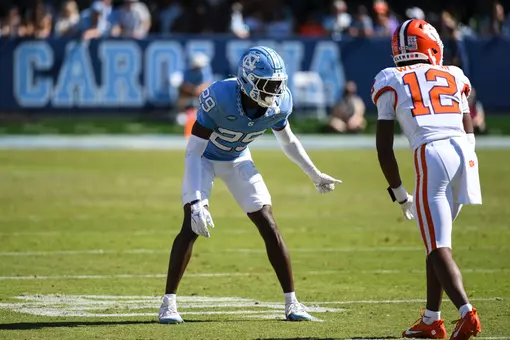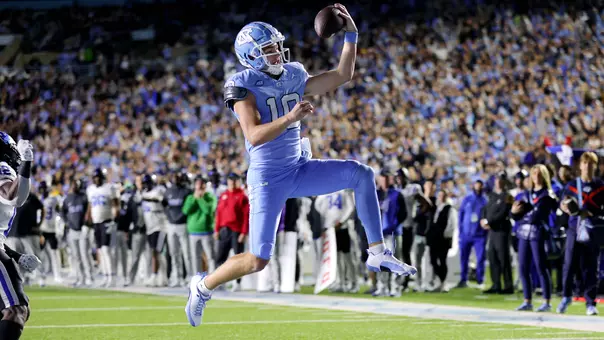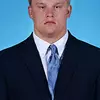University of North Carolina Athletics
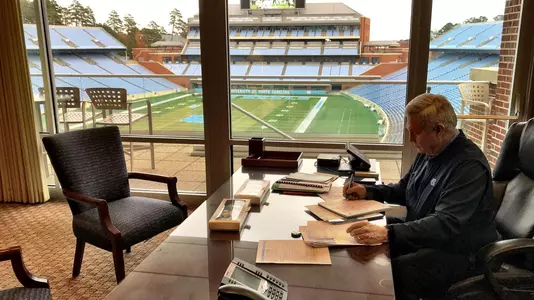
Extra Points: Energized
January 14, 2019 | Football, Featured Writers, Extra Points
By Lee Pace
In wake of Larry Fedora's dismissal as the Carolina head football coach in late November, tight end Brandon Fritts looked around the Tar Heel locker room and was struck with the fact none of his fellow enrollees from January 2014 like Elijah Hood, Bentley Spain or M.J. Stewart were still around. Gone too were other members of that freshman class who arrived the following August like Tyler Powell and Malik Carney. The coach who recruited him out of Mentor, Ohio, Blake Anderson, was long gone, and his high school buddy, Mitch Trubisky, was slinging it for the Chicago Bears. One tight end coach, Seth Littrell, was now a head coach in Texas, and his most recent position coach, Chad Scott, could stay or go at the pleasure of new head coach Mack Brown.
"I was the last person in my class. Everyone who recruited me was gone. I thought maybe it was time for a fresh start," Fritts says.
A knee injury in the spring of 2018 sidelined Fritts for all of what turned out to be a gut-wrenching season for the Tar Heels, and he was granted a sixth year of eligibility after having been redshirted in 2014. He announced via Twitter on Dec. 7 he would transfer, and in fact soon made an inspection trip to another Power 5 conference institution.
But the phone rang from new tight ends coach Tim Brewster, who pitched Fritts on the long line of Tar Heels from the 1990s like Deems May, Greg DeLong, Freddie Jones and Alge Crumpler who Brewster had coached and helped prepare for substantial NFL careers. Brown himself called and told Fritts he needed tough, talented and experienced leaders for his first team. Offensive coordinator Phil Longo reached out and laid down the importance of the tight end in his plans for moving the ball and scoring points in 2019.
It occurred to Fritts that the grass isn't necessarily greener.
"After I talked to the three of them, it kind of clicked with me and these coaches," Fritts says. "The way I left was not how I wanted to go out, being injured and going 2-9. I'm very excited. There's a lot of positive energy around the building. I think we're very close to a lot of good things happening."
And thus Fritts deleted that exit Tweet and posted a re-entry message on Jan. 8, saying, "I can't wait to finish my career off in Carolina blue."
Positive energy, indeed.
Six weeks into his second tenure as the Tar Heels' coach, Brown is applying his thumbprint to every element of the program—staffing, infrastructure, facilities, discipline and recruiting, and in the case of someone like Fritts, "re-recruiting" an incumbent Tar Heel.
He's upgraded the players' lounge with new furniture, gaming consoles and a pop-a-shot basketball game and is having power docking stations for cell phones installed in the locker room.
"I told them, 'We're going to give you everything the NCAA will allow us to give you, and you're going to give us everything you've got. That's the only way it works,'" Brown says.
He's expanded the support staff structure by adding two veteran coaches, Darrell Moody and Sparky Woods, as "senior advisors." With three-quarters of a century of combined coaching and scouting experience, Moody (with tenures under Brown and Carl Torbush at Carolina) and Woods (former head coach at Appalachian State and South Carolina) will break down opponent film, provide self-scouting input and evaluate recruiting tape—all without the ambition, ego and politics of youth.
"Instead of having a bunch of young guys, I want several guys I can trust who've seen it all," Brown says, referring to some programs with a dozen or more staffers in analyst, operations or player-development titles. "What they'll bring to the operation is pretty powerful stuff."
And he's instilled a sense of order and accountability and a renewed attention to detail that can be the glue that pulls everything together in successful businesses and athletic teams.
In his first team meeting of the new year last Tuesday, Brown referenced the national title game the night before between Clemson and Alabama, told the team he'd been in two of those games (his Texas Longhorns winning the 2005 title), and said, "The difference in where you are to get there is not nearly as far as you think. It's hard, but it's the little things."
One of those details is embodied in a mannequin now positioned near the front doorway to the locker room. It's adorned each morning with the uniform to be worn that day in offseason strength and conditioning workouts. One day it might be gray shirts and navy shorts, another day Carolina blue shorts and white shirts, and on a day of outdoor training, the specific outerwear will be displayed. If there's an important dinner function coming up, the mannequin might be attired in khakis and a button-down shirt.
"People will see that as a small thing, but to me that's huge," says senior running back Antonio Williams. "That to me that is discipline and structure. We are supposed to look a certain way, one way, not everyone wearing different gear. I think this helps us feel more as one than we did before."
"Before, as long as it was Carolina-issue, we could wear whatever and guys wore different stuff," Fritts adds. "Now it's, 'We're one team, one family, we're one.' No one is above anyone else. We're going to look the same. We're building a culture that we are one, not a hundred individuals."
Brown in his limited time around his new team has given it a collective hug for what it's been through—"You deserve to win more than two games as hard as you've worked," he says—and has also paddled its derriere for laziness and sloppiness maintaining the locker room and cleaning up after meal functions. The latter is a subject Fritts acknowledged with Brown in a private meeting upon deciding to return for another season.
"I told him, 'One of the biggest things with this team is, we've got to grow up a little bit,'" Fritts says. "We've got to become not only better players but better men off the field. Because ultimately, if we're better men off the field, we'll have a better sense of maturity and it will show up in the way we play.
"Everyone knows we're not very far away. Coach Brown is going to be the missing piece. He's going to make sure the little things do not fall through the cracks. He's going to be the guy who makes sure we take care of business on and off the field—like making sure the locker room is clean."
Brown for his part in six weeks back in Chapel Hill has delighted in seeing the new indoor practice facility that will be available on March 3 when spring ball starts—"It's as good as anything I've seen across the country," he says—and revisited old dining haunts such as Mama Dip's, Breadman's and 411 West. He has relished getting back into the fray of texts and calls and meetings, of a fire to put out here and an initiative and idea to launch there. Energy at the age of 67 has not been a problem.
"I don't need a lot of sleep, I'm good on five or six hours," he says. "I'm usually in bed by midnight and back in here by seven."
One typical day last week found him holding impromptu one-on-ones with players and ironing out scheduling details with his coaches—in particular, where would Brown travel over the next three weeks of the recruiting season after hosting a half dozen players for official visits the coming weekend? He notes that spring practice starts in less than two months and he's working on plans for a significant event around the spring game April 13 that will appeal to both recruits and fans.
"I'm a whole lot better coach now than I was five years ago," Brown says of his exit from Texas in December 2013 and ensuing mini-career as a television analyst. "I've had time to get away from it, I've had time to look and learn and get my energy back. I was planning on doing this one more time. I put five years into what I wanted to do differently if I did come back."
That translates to a certain bearing that a coach wearing a national title ring and "Hall of Fame" by his name exudes around his players. And it's only ramped up with four of 10 assistants in that first team meeting professing their success as a player or very start in the coaching profession back to Brown at Carolina or Texas—Brewster, Dré Bly, Tommy Thigpen and Tim Cross, the latter going on a heartfelt and rousing "Let's get this work" rant that went viral online last week.
"When a coach has confidence, it rubs off on the team," says Williams, who's seen college football from near the tippy-top via two years at Ohio State before transferring to Chapel Hill. "We needed that confidence. We ended the 2017 season on a loss and then lost nine games this year. It's hard to have confidence in the face of something like that. These men have all the confidence in the world, and it's rubbing off on us."
Brewster coached with Brown for nine years at Carolina and then four at Texas, leaving Austin after the 2001 season on an odyssey that included two NFL stops, a head-coaching gig at Minnesota and a national title run as tight ends coach for Jimbo Fisher at Florida State in 2013. He says Brown hasn't lost any of the energy, edge or demeanor he knew so well years ago and watched it all come together in that meeting last Tuesday.
"He was totally energized," Brewster said. "He was very commanding and absolutely riveting. There was a lot of emotion in the room. He sent a strong and precise message. First impressions last—and that one will last a long time."
Carolina graduate Lee Pace (1979) has written "Extra Points" since 1990 and reported from the sidelines for the Tar Heel radio network since 2004. Reach him at leepace7@gmail.com and follow him @LeePaceTweet.
In wake of Larry Fedora's dismissal as the Carolina head football coach in late November, tight end Brandon Fritts looked around the Tar Heel locker room and was struck with the fact none of his fellow enrollees from January 2014 like Elijah Hood, Bentley Spain or M.J. Stewart were still around. Gone too were other members of that freshman class who arrived the following August like Tyler Powell and Malik Carney. The coach who recruited him out of Mentor, Ohio, Blake Anderson, was long gone, and his high school buddy, Mitch Trubisky, was slinging it for the Chicago Bears. One tight end coach, Seth Littrell, was now a head coach in Texas, and his most recent position coach, Chad Scott, could stay or go at the pleasure of new head coach Mack Brown.
"I was the last person in my class. Everyone who recruited me was gone. I thought maybe it was time for a fresh start," Fritts says.
A knee injury in the spring of 2018 sidelined Fritts for all of what turned out to be a gut-wrenching season for the Tar Heels, and he was granted a sixth year of eligibility after having been redshirted in 2014. He announced via Twitter on Dec. 7 he would transfer, and in fact soon made an inspection trip to another Power 5 conference institution.
But the phone rang from new tight ends coach Tim Brewster, who pitched Fritts on the long line of Tar Heels from the 1990s like Deems May, Greg DeLong, Freddie Jones and Alge Crumpler who Brewster had coached and helped prepare for substantial NFL careers. Brown himself called and told Fritts he needed tough, talented and experienced leaders for his first team. Offensive coordinator Phil Longo reached out and laid down the importance of the tight end in his plans for moving the ball and scoring points in 2019.
It occurred to Fritts that the grass isn't necessarily greener.
"After I talked to the three of them, it kind of clicked with me and these coaches," Fritts says. "The way I left was not how I wanted to go out, being injured and going 2-9. I'm very excited. There's a lot of positive energy around the building. I think we're very close to a lot of good things happening."
And thus Fritts deleted that exit Tweet and posted a re-entry message on Jan. 8, saying, "I can't wait to finish my career off in Carolina blue."
Positive energy, indeed.
Six weeks into his second tenure as the Tar Heels' coach, Brown is applying his thumbprint to every element of the program—staffing, infrastructure, facilities, discipline and recruiting, and in the case of someone like Fritts, "re-recruiting" an incumbent Tar Heel.
He's upgraded the players' lounge with new furniture, gaming consoles and a pop-a-shot basketball game and is having power docking stations for cell phones installed in the locker room.
"I told them, 'We're going to give you everything the NCAA will allow us to give you, and you're going to give us everything you've got. That's the only way it works,'" Brown says.
He's expanded the support staff structure by adding two veteran coaches, Darrell Moody and Sparky Woods, as "senior advisors." With three-quarters of a century of combined coaching and scouting experience, Moody (with tenures under Brown and Carl Torbush at Carolina) and Woods (former head coach at Appalachian State and South Carolina) will break down opponent film, provide self-scouting input and evaluate recruiting tape—all without the ambition, ego and politics of youth.
"Instead of having a bunch of young guys, I want several guys I can trust who've seen it all," Brown says, referring to some programs with a dozen or more staffers in analyst, operations or player-development titles. "What they'll bring to the operation is pretty powerful stuff."
And he's instilled a sense of order and accountability and a renewed attention to detail that can be the glue that pulls everything together in successful businesses and athletic teams.
In his first team meeting of the new year last Tuesday, Brown referenced the national title game the night before between Clemson and Alabama, told the team he'd been in two of those games (his Texas Longhorns winning the 2005 title), and said, "The difference in where you are to get there is not nearly as far as you think. It's hard, but it's the little things."
One of those details is embodied in a mannequin now positioned near the front doorway to the locker room. It's adorned each morning with the uniform to be worn that day in offseason strength and conditioning workouts. One day it might be gray shirts and navy shorts, another day Carolina blue shorts and white shirts, and on a day of outdoor training, the specific outerwear will be displayed. If there's an important dinner function coming up, the mannequin might be attired in khakis and a button-down shirt.
"People will see that as a small thing, but to me that's huge," says senior running back Antonio Williams. "That to me that is discipline and structure. We are supposed to look a certain way, one way, not everyone wearing different gear. I think this helps us feel more as one than we did before."
"Before, as long as it was Carolina-issue, we could wear whatever and guys wore different stuff," Fritts adds. "Now it's, 'We're one team, one family, we're one.' No one is above anyone else. We're going to look the same. We're building a culture that we are one, not a hundred individuals."
Brown in his limited time around his new team has given it a collective hug for what it's been through—"You deserve to win more than two games as hard as you've worked," he says—and has also paddled its derriere for laziness and sloppiness maintaining the locker room and cleaning up after meal functions. The latter is a subject Fritts acknowledged with Brown in a private meeting upon deciding to return for another season.
"I told him, 'One of the biggest things with this team is, we've got to grow up a little bit,'" Fritts says. "We've got to become not only better players but better men off the field. Because ultimately, if we're better men off the field, we'll have a better sense of maturity and it will show up in the way we play.
"Everyone knows we're not very far away. Coach Brown is going to be the missing piece. He's going to make sure the little things do not fall through the cracks. He's going to be the guy who makes sure we take care of business on and off the field—like making sure the locker room is clean."
Brown for his part in six weeks back in Chapel Hill has delighted in seeing the new indoor practice facility that will be available on March 3 when spring ball starts—"It's as good as anything I've seen across the country," he says—and revisited old dining haunts such as Mama Dip's, Breadman's and 411 West. He has relished getting back into the fray of texts and calls and meetings, of a fire to put out here and an initiative and idea to launch there. Energy at the age of 67 has not been a problem.
"I don't need a lot of sleep, I'm good on five or six hours," he says. "I'm usually in bed by midnight and back in here by seven."
One typical day last week found him holding impromptu one-on-ones with players and ironing out scheduling details with his coaches—in particular, where would Brown travel over the next three weeks of the recruiting season after hosting a half dozen players for official visits the coming weekend? He notes that spring practice starts in less than two months and he's working on plans for a significant event around the spring game April 13 that will appeal to both recruits and fans.
"I'm a whole lot better coach now than I was five years ago," Brown says of his exit from Texas in December 2013 and ensuing mini-career as a television analyst. "I've had time to get away from it, I've had time to look and learn and get my energy back. I was planning on doing this one more time. I put five years into what I wanted to do differently if I did come back."
That translates to a certain bearing that a coach wearing a national title ring and "Hall of Fame" by his name exudes around his players. And it's only ramped up with four of 10 assistants in that first team meeting professing their success as a player or very start in the coaching profession back to Brown at Carolina or Texas—Brewster, Dré Bly, Tommy Thigpen and Tim Cross, the latter going on a heartfelt and rousing "Let's get this work" rant that went viral online last week.
"When a coach has confidence, it rubs off on the team," says Williams, who's seen college football from near the tippy-top via two years at Ohio State before transferring to Chapel Hill. "We needed that confidence. We ended the 2017 season on a loss and then lost nine games this year. It's hard to have confidence in the face of something like that. These men have all the confidence in the world, and it's rubbing off on us."
Brewster coached with Brown for nine years at Carolina and then four at Texas, leaving Austin after the 2001 season on an odyssey that included two NFL stops, a head-coaching gig at Minnesota and a national title run as tight ends coach for Jimbo Fisher at Florida State in 2013. He says Brown hasn't lost any of the energy, edge or demeanor he knew so well years ago and watched it all come together in that meeting last Tuesday.
"He was totally energized," Brewster said. "He was very commanding and absolutely riveting. There was a lot of emotion in the room. He sent a strong and precise message. First impressions last—and that one will last a long time."
Carolina graduate Lee Pace (1979) has written "Extra Points" since 1990 and reported from the sidelines for the Tar Heel radio network since 2004. Reach him at leepace7@gmail.com and follow him @LeePaceTweet.
Players Mentioned
UNC Softball: Tar Heels Stay Hot in Win vs Princeton, 5-2
Saturday, February 21
UNC Men's Basketball: Veesaar, Heels Rally Past Syracuse, 77-64
Saturday, February 21
UNC Gymnastics: Tar Heels Record Highest Score of Season at Cal
Saturday, February 21
UNC Softball: LeGette Walks-Off App State in Extras, 5-3
Saturday, February 21











